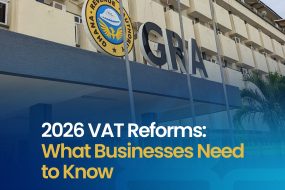
In Ghana, income tax filing is a mandatory requirement for individuals and businesses to comply with the regulations set by the Ghana Revenue Authority (GRA). This comprehensive guide covers the essential details of income tax filing in Ghana. It also emphasizes the importance of compliance with tax laws and regulations.
Income tax filing involves submitting an official document by the specified due date. This includes key details such as the taxpayer’s name, Tax Identification Number (TIN), current tax office, and the reporting period covered.
Each type of income tax return in Ghana has specific requirements tailored to the respective taxpayer category. These requirements typically encompass details and other relevant financial information necessary for accurate reporting and assessment.
Who needs to file income Tax Returns?
Both individuals and businesses in Ghana are required to file final income tax returns based on their assessable income or business activities.
- Individuals: Resident individuals earning income from employment, investments, or other sources must file income tax returns. This is known as the Personal Income Tax return.
- Businesses: Similarly, businesses, such as companies, partnerships, sole proprietorships, and other entities operating within Ghana are also obligated to file income tax returns. This is known as the Corporate Income Tax return.
Tax Year and Filing Deadline for income tax
The tax year in Ghana follows the calendar year, from January 1st to December 31st. Final tax returns are typically due within four months after the end of the tax year, with the deadline usually falling on April 30th of the following year. Corporations can apply to change their tax year to better suit their operational needs.
If you’re unable to meet the filing deadline due to certain reasons, you can apply for an extension at your designated tax office by submitting a letter explaining your situation. If approved, you’ll be granted a 60-day extension period to file your returns.
Forms and Documentation Required
- Individuals: Final Income tax returns for individuals are filed using the Personal Income Tax (PIT) Form. Supporting documents, such as financial statements, should accompany the tax return.
- Businesses: Different entities use specific tax forms, such as the Company Income Tax Return for companies. Businesses are required to provide audited financial statements, profit and loss accounts, balance sheets, and other financial documentation when filing final income tax returns.
Filing Methods for Income Tax
Final income tax returns should be filed electronically through the Ghana Revenue Authority’s (GRA) online portal and, in extreme cases, manually at GRA offices (NB: the taxpayer may still be required to file online). Electronic filing offers convenience and efficiency, allowing taxpayers to submit their returns from anywhere with internet access.
Filing Processes for Individuals and Businesses with GRA
For Individuals:
- Accessing the Online Portal:
- Log in to the GRA online portal and navigate to the “File Return” section.
- Select “Personal Income Tax” as the tax type to proceed with filing.
- Providing Required Details:
- Choose your source of revenue (business, employment, or investment) and enter relevant details accordingly.
- Attach a copy of the financial statements and proceed.
- Essential information includes business location (including Ghana Post GPS address), business activity details, tenancy status of business premises, and landlord information.
- Input details about your tax consultant (if applicable) and provide balance sheet and profit and loss statement data as required by the form.
- Calculating Chargeable Income:
- The inputted financial details help ascertain your chargeable income.
- This chargeable income is subject to the annual Pay As You Earn (PAYE) graduated schedule to determine your annual income tax liability, factoring in tax reliefs, withholding credits, provisional assessments paid, and capital allowances.
For Businesses:
- Accessing the Online Portal:
- Log in to the GRA online portal and proceed to the “File Return” section.
- Choose “Company Income Tax” as the tax type for filing.
- Providing Required Details:
- Submit audited financial statements signed by a licensed Audit Firm, along with essential business information such as business location and date of incorporation.
- Include details on the tenancy status of business premises and provide information about your tax consultant (if applicable).
- Input balance sheet and profit and loss statement data as per the form requirements.
- Calculating Chargeable Income:
- Similar to individuals, the provided financial data helps determine the business’s chargeable income.
- Business chargeable income is typically subject to income tax rates, often at 25% of the chargeable income (with variations based on business location, type, and activities).
- The annual income tax liability is computed considering withholding credits, provisional assessments paid, capital allowances, and applicable tax rebates.
Tax Payments and Penalties for Income Tax Filling
It’s crucial to promptly settle any tax liabilities identified during the income tax return filing process. Failure to file your income tax returns on time or inaccuracies may lead to penalties and interest charges:
- For late submission, you could face a penalty of GHC 500 plus GHC 10 for each day overdue after the deadline.
- Late payment interest involves a compound interest at 125% of the Bank of Ghana’s policy rate. (Refer to sections 51 and 53 of the Revenue Administration Act 2016, Act 915).
Seeking Professional Assistance
Income tax filing can be complex, particularly for businesses. Therefore, it’s advisable to seek guidance from tax professionals or consultants to ensure compliance and tax planning strategies.
In conclusion, income tax return filings play a crucial role in promoting transparency and accountability within Ghana’s tax ecosystem. Consequently, understanding and fulfilling tax obligations enable individuals and businesses to contribute to economic growth while avoiding potential penalties and compliance issues.
Explore Valuable Resources on Our Blog
Delve into a treasure trove of insightful content about annual income tax filing and related topics on our blog. Enhance your understanding of tax return filing in Ghana and explore various related subjects by visiting our blog today!












No Comments